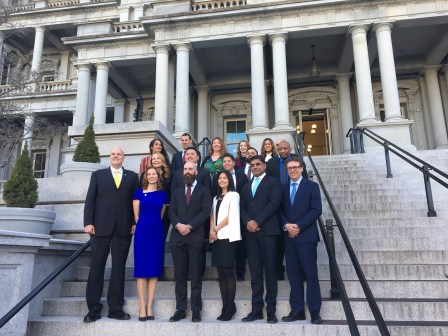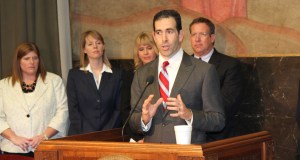The Department of Health and Human Services’ IDEA Lab is signing a one-year lease on a handful of talented entrepreneurs to help solve some of health care’s biggest issues.
IDEA Lab announced a new cohort for its Entrepreneurs-In-Residence program, which matches entrepreneurs from outside government with HHS employees to innovate on “high risk high reward projects” crowdsourced from within the agency, according to a blog post. This latest group, four entrepreneurs with varying backgrounds in private sector innovation, was selected from the most talented applicant pool yet, the blog said.
During the 12-month period, the entrepreneurs will use agile and lean methodologies to address problems that might require unconventional thinking or lack the typical resources needed for a solution.
The third HHS Entrepreneurs-In-Residence class is:
- Danny Boice, the co-founder and CTO of conference call startup Speek, will help the Administration for Community Living explore how the elderly and disabled use technology and media to access services.
- Mark Scrimshire, co-founder of consumer-focused health care company HealthCa.mp, will team with the Centers for Medicare and Medicaid Services to help redesign its Blue Button initiative as a Data-as-a-Service platform for third-party applications.
- Paula Braun is a data scientist with Elder Research Inc. Braun, who started her career as a Presidential Management Fellow, will re-enter federal government for a year to help the Centers for Disease Control and Prevention create a next-generation Electronic Death Registration System.
- David Portnoy, co-founder and CTO of Symbiosis Health, will help the HHS Office of the Chief Information Officer and the HHS IDEA Lab build public-facing research database applications for the department’s massive amount of data.
Bryan Sivak, CTO at HHS and leader of the IDEA Lab, talked highly of the EIR program recently at FedScoop’s annual FedTalks event. Though there are several innovative programs under the IDEA Lab umbrella, the CTO focused much of his keynote on the anecdotal success of HHS’ Entrepreneurs-In-Residence.
Limiting the entrepreneurs’ term to 12 months, he said, is vital to program’s ability to bring rapid solutions to major problems.
“The 12-month thing is really important because with 12 months, by definition if you only have 12 months to solve the problem, you almost by definition have to do things differently,” Sivak said. “You cannot follow standard bureaucratic procedure.”
Sivak keyed in on an entrepreneur from the program’s first class, David Cartier, a 25-year veteran of UPS tasked with helping create an electronic tracking system for organ donations while at HHS’ Health Resources and Services Administration.
“They brought David in because he had all this experience with UPS with [radio-frequency identification] tagging and tracking and could help them do this,” Sivak said. But Cartier’s experience was mostly with “innovation practices and design thinking and human-centered design,” not medical procedure. So, Sivak said, he spent quite a bit of time in operating rooms and realized technicians, nurses and doctors found it cumbersome to handwrite between 30 and 70 labels for the organs transplanted each night. It not only leaves room for human error, like poor transcriptions, but it also takes quite a bit of time, Sivak said. “When you’re working with organs, every minute counts.”
His solution? A mobile printing and barcode system, as Sivak called it, to be used in operating rooms for the rapid tagging and dissemination of the organs.
When Cartier’s time was done and the solution’s pilot wrapped up, they took the systems away from the operating rooms because it was meant to be no more than a test phase. The operating room users, though, demanded it be brought back, Sivak said. “And to me, that’s as good as you can get, right? The users of the system want to continue using it.”







